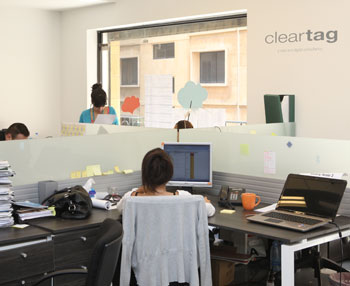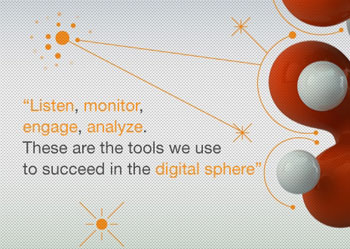Cleartag Lebanon: Exclusive Interview
The Lebanese community is one of the most vibrant economies in the digital industry. Mr. Dajani says Lebanese digital industry is not competing with Dubai but it is a continuation of development; one big flow. For now, salaries within the digital sector in Lebanon are increasing as there is a greater and greater need for more talented people.
Interview with Tarek Dajani, CEO at Cleartag

Who are the largest companies in Lebanese digital industry?
At this point, you have around three or four considerably large companies. The biggest indicator is the size of the team. It gives you an idea of capabilities and ability to work on large-scale projects.
I do believe that there are smaller actors that have a lot of impact. There are a lot of small individual companies that do amazing work. This is a vibrant, always transforming ecosystem. That is why Cleartag is more of a digital agency than they are web design or development. In this field, you need to keep reinventing the game. When we started 10 years ago, web design and development was the key demand. Now, however, we are in a multiplatform, multi-touchpoint ecosystem where people need engagement on the retail front, on the tangible front or on the social media front.
If we talk about applications, there are HTML5 applications, Web applications, social applications, consulting and strategy social platforms and finally, one of the most interesting in my view: one on one interaction, looking at multi-touch, new technologies, how they actually have an impact and interact with each other. They complement all digital experiences.
Now, let us talk about the digital industry in Lebanon.
I think this all adds an edge to Lebanon.  All the best universities in the region are here, some of which are competitive on a global scale. University graduates from Lebanon go abroad and attend some of the greatest existing institutions while doing great work. Since the war ended, perhaps, digital industry has been the most promising sector. In reality, there is software development, product development and there is Web and digital development.
All the best universities in the region are here, some of which are competitive on a global scale. University graduates from Lebanon go abroad and attend some of the greatest existing institutions while doing great work. Since the war ended, perhaps, digital industry has been the most promising sector. In reality, there is software development, product development and there is Web and digital development.
If you look at the scale of Lebanon from a geographic point of view, it is a small country. However, if you look at human capital, it is undoubtedly the best in the region. It’s normal for you to be very well positioned. We picked up pretty well initially, in the 90’s, then there was a bit of a slowdown. I think that now, the rise of entrepreneurship, there is a sense of involvement in a few who are thinking, “Okay, as an individual, I can actually be a prominent player in the region.” That has been the core balance for a while. You would offer web design, software, web development services — for the region, but also internationally.
But I think there is also an emergence of more interesting aspects which is the ability to create value, create assets, create products, create intellectual property. That, I believe, is coming, and will be a core competitive advantage, because you would have the pope, the education, the exposure and also the flexibility, adaptability and entrepreneurship of the youth and of the economy.
What is your take on the growth in the sector? It seems like it is about 25%… What do you think?
I would not disagree with the 25%. Ever since 2008 and 2009, this has been a very vibrant sector, so I wouldn’t be surprised to see this kind of growth. The sector has gained visibility and I think that more so with Arab spring and so on, for some reason, there has been an increase, an amplification of that visibility. There have been more youth interested in joining that sector. There have been more businesses willing to invest in that sector. Existing players have been gaining more momentum. Actually, we could probably expect higher growth moving forward if you start analyzing not just pure growth in market share but also the creating of intellectual property and value. Cleartag has had bigger growth than that. Growth of that kind is usually rare, but given the current visibility on digital, it can be explained. If you also add to that the growth of smaller companies that are emerging, creating platforms and products, in a year from now, the growth might actually be bigger than that.
If you look at the scale of Lebanon from a geographic point of view, it is a small country. However, if you look at human capital, it is undoubtedly the best in the region. It’s normal for you to be very well positioned.
If I’m not mistaken, Dubai is also trying to develop its digital industry. Other countries understand that this industry is the future. How competitive is the Lebanese digital industry? What are some of the specific challenges that could threaten this top position?
Again, in this day and age, if you want to look at the sector, look at the reach, not just as Lebanon isolated within its own boundaries. The Lebanese community is one of the most vibrant economies in the digital industry. Dubai – although it is doing a very good job – I think Dubai realizes some of its limitations – for instance, the size of its population. They rely on expats. They rely on different kinds of business models.
For the Lebanese, Dubai has an interesting capitalization export market. You create products, concepts, value, and then you can either export it, implement it, etc. I think there is continuity. I do not necessarily see Dubai competing with Lebanon. I think we should look at the region and see it as an ecosystem, particularly in the digital sector. Would you think that California competes with New York? They could be seen as competing, but as a whole, they are an ecosystem. If we look at tourism, maybe there is competition. And if we look at banking, the same thing applies. But here, it’s a continuation, one big flow.
But the Lebanese market is still a market. There are market shares, competition and threats. Can we truly see the digital sector as one big vague entity spread across the region?
Very simply, the digital market in Lebanon is a small market. Are there any threats? What kind of threats? If you are thinking of a threat to a company operating in the market, I don’t think there are any threats for someone entering the market. Since it is a small market, you will not worry about a company that operates in Dubai moving to Lebanon and trying to gain market share.  The scale does not make that a valid proposition.
The scale does not make that a valid proposition.
I am not saying that we are too small to be impactful. The market is there. You compete locally. Of course we have competitors on that scale, but competition is always healthy and part of the Lebanese model, particularly those that can be exported, be it manufacturing (lightweight manufacturing), digital, and so on… You always have an outreach, balancing between satisfying the local market and looking at the global growth. That is a fairly normal model.
To us, there are threats to economy on the digital level if you don’t look outbound. However, if you refer to threats from foreign players to the local economy, I would say that there is no such thing. For instance, if you are in the hotel industry, you could worry about big players coming in and investing in Lebanon, because that is a different mechanism. You could worry about Lebanese food concepts and the threat of international brands. On the digital level, it should not be an area of concern.
But if you consider the graduates, the freelance workers and other people entering the job market creating more competition… What does this competition mean to the established players? Does it not force you outside?
There is one problem here which is the talent pool. There is a purpose for all these people coming in, because the digital industry is getting bigger and emerging, gaining more momentum. There is a need for more and more people, so salaries are increasing.
There is competition in that sense, and that is also a threat. If we do not create an education system or a whole ecosystem that produces the talent needed, there will be saturation. This will be a difficult situation for growth. If you want to talk about internal potential limitation, then yes, this can definitely be a threat. Actually, it is happening right now. It is becoming more and more difficult to find the top talents – not because they don’t exist, but because they are already taken, they all have a job already. Whenever a student graduates, that student is already absorbed by the market.
There is also the problem of pretension, because this talent is now global. If you are an engineer or a data scientist, someone with a very specific know how, your opportunity is worldwide.  How can those people be retained? That is a challenge, and one that needs to be faced from so many points. You need to create the right opportunities, because this generation is not only looking for money, but also the right challenges. A good engineer is not only looking for a good salary, but also for a good project to work on that is intellectually and scientifically stimulating. You also need to create the right ecosystem, safety mechanism, psychological and physical, etc. So many items need to come into play and there is no clear answer, so there is definitely a challenge.
How can those people be retained? That is a challenge, and one that needs to be faced from so many points. You need to create the right opportunities, because this generation is not only looking for money, but also the right challenges. A good engineer is not only looking for a good salary, but also for a good project to work on that is intellectually and scientifically stimulating. You also need to create the right ecosystem, safety mechanism, psychological and physical, etc. So many items need to come into play and there is no clear answer, so there is definitely a challenge.
How does Cleartag play the market of the GCC? What kind of challenges do you meet or the way? What are the opportunities that you see?
The way we have been, the way we still are and the way we will be is a company that is different because of its innovation. That is why when you ask about web design and development, about whether we are just about that or more, I will tell you that from an early point we were a company that acknowledged the need for these developments, for experiments across industries when it comes to digital.
Cleartag has a dedicated lab that works on the intersection of hardware, software and so on. For Cleartag, this has always been an edge, an advantage, because it has allowed us to be a company with everything that is happening globally and it allows up to always bring a fresher perspective to the market. That is a competitive advantage that we have used in the local market, in our expansion in the region. In that we see a great opportunity.
This has allowed us to reinvent many business lines. Cleartag started as one business line, being the web design and development, which expanded to the tangible media which is the retail experience, then to social media, infrastructure, cloud services. When you keep on reinventing your service propositions, around a general guiding line, of course, it allows you to exponentially expand your market share versus linearly growing in one line, so that is a good advantage. Also, we plan on not just looking at the region. For us, the region is important in the natural growth and expansion. It is an extension of the domain. I do not see it as a different market. No, our view is to look at a global scheme. These days, it is easy to look at the world as an almost flat plain. I do not think that you need to look at the region only. You should look beyond the geography of the Middle East.
There are companies outside providing these services. What makes Cleartag truly special?
Cleartag is a company that reinvents ahead of the market. We have always been known as a company that shows the way to other companies, that takes new directions. Back then, we were the ones who first moved towards social media and the science of analytics in social media, well ahead of the surge of demand on that front. Accordingly, we were well-positioned to do that.
We are now working on fields that we believe are going to be the next surface of interaction, like retail experience where we merge sensors with apps and all sorts of interaction touch points into enhancing customer experience to gain better understanding of that experience. This is a service that you will eventually see rising in the region and internationally.
Therefore, always having this kind of one step ahead through innovation and development has served us well as much as it did our clients. It’s a good edge, but then again, we are not the only players. We will never be the only players. The thing that will keep pushing the envelope and creating the opportunities is the fact that there are so many players, and also the tensions that force us to be creative and to look forward to the next thing. I think the next thing will be embracing the fact that all traditions of business models we have been working on have changed, whether it be banking, shopping and many other industries.
The regional rise of platforms is going to generate tremendous growth. We are way behind everything that is happening worldwide and the big retailers in the region will be there. That is not the big thing, but it is definitely something which should be considered. I think the physical experience is going to be transformed. We are going to be enhancing through technologies like multi-touch, various sensors, intelligent spaces, architectural spaces… This is going to be a full transformation, because what we talk about as web or Internet is going to be everywhere around us in our physical environment.
Now, if you just think about what that represents, where bits and bytes go beyond the simple screen, imagine the opportunity of creating concepts, products and experiences around that. In that regards, we are gearing up to be a great leader in that domain.